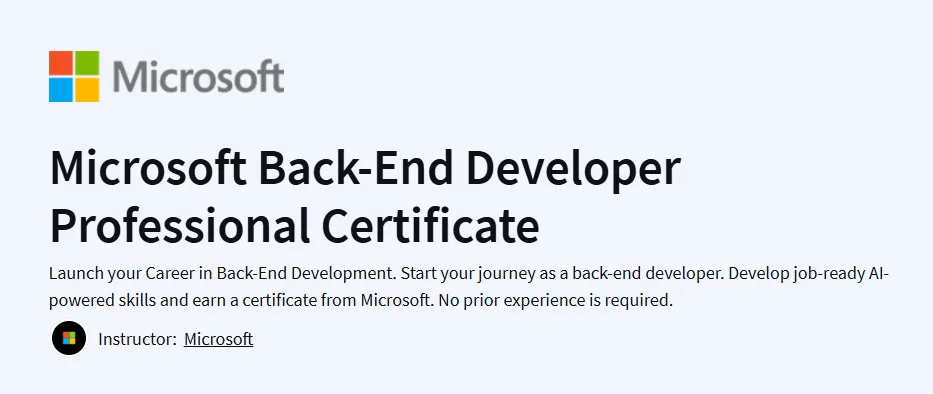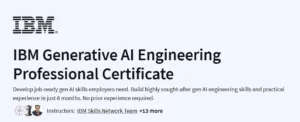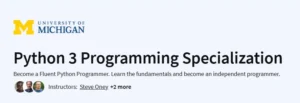What you will learn inMicrosoft Back-End Developer Professional Certificate Course
- Master C# programming and .NET Core for enterprise back-end development
- Build RESTful APIs with ASP.NET Core and implement authentication/authorization
- Design and optimize SQL Server databases with Entity Framework Core
- Develop cloud-native applications using Microsoft Azure services
- Implement CI/CD pipelines with Azure DevOps
- Apply microservices architecture patterns
- Complete a capstone project deploying a full back-end solution to Azure
Program Overview
C# and .NET Fundamentals
⏱️6-8 weeks
- Core C# syntax, OOP principles, and async programming
- .NET Core CLI and project structure
- Unit testing with xUnit
API Development with ASP.NET Core
⏱️ 8-10 weeks
- Build RESTful services with controllers and minimal APIs
- Implement JWT authentication and role-based authorization
- Document APIs with Swagger/OpenAPI
Database Development
⏱️6-8 weeks
- SQL Server design and query optimization
- Entity Framework Core for data access
- NoSQL solutions with Cosmos DB
Cloud Integration
⏱️8-10 weeks
- Deploy to Azure App Service and Container Apps
- Implement serverless with Azure Functions
- Configure Azure SQL and caching with Redis
DevOps & Microservices
⏱️6-8 weeks
- CI/CD with Azure DevOps
- Docker containerization
- Basic Kubernetes orchestration
Capstone Project
⏱️10-12 weeks
- Develop production-ready back-end system
- Implement full security and monitoring
- Performance tuning and scalability
Get certificate
Job Outlook
- Salary range: 80K−130K for .NET back-end roles (Payscale)
- Industry demand: 72% of enterprises use .NET for critical systems (Microsoft)
- Top employers: Accenture, Deloitte, Microsoft partners
- Career paths: Back-End Developer → Solutions Architect → Cloud Engineer
- Certification value: Qualifies for Microsoft Certified: Azure Developer Associate
Explore More Learning Paths
Advance your back-end development skills and gain hands-on experience with these professional certification programs. Each course equips you with the knowledge and tools needed to build scalable, secure, and efficient server-side applications.
Related Courses
Introduction to Back-End Development Course – Learn the fundamentals of server-side programming, databases, and application architecture.
IBM Back-End JavaScript Developer Professional Certificate Course – Master back-end development using JavaScript, Node.js, and related technologies.
IBM Back-End Development Professional Certificate Course – Gain comprehensive skills in building robust back-end systems and APIs.
Related Reading
What Is Management? – Explore management principles that can help structure development projects and team workflows effectively.
Specification: Microsoft Back-End Developer Professional Certificate Course
|
FAQs
- It’s designed for beginners with no prior experience, explicitly saying “No prior experience is required.”
- The program starts from basics—first building coding logic before moving to advanced server-side development.
- That said, for complete newcomers, parts of the course may feel fast-paced—especially Object-Oriented Programming (OOP) sections—so some self-driven catch-up may be needed.
- You’ll master C# programming, .NET Core, ASP.NET Core, and unit testing with xUnit for enterprise-grade back-end development.
- Learn to build RESTful APIs, implement JWT authentication, utilize Swagger/OpenAPI, and manage both SQL Server (with Entity Framework Core) and NoSQL (Cosmos DB).
- Dive into cloud integration by deploying to Azure App Service, using Azure Functions (serverless), setting up Azure SQL, and caching with Redis.
- Gain experience in DevOps practices—building CI/CD pipelines with Azure DevOps, containerizing with Docker, and basic Kubernetes orchestration.
- Culminates in a capstone project: build a full production-ready backend system with security, performance tuning, and scalability, then deploy it to Azure.
- The certificate consists of eight courses, each focused on a core area of back-end development—from foundations to deployment.
- Estimated time for each segment (e.g., Foundations, API Development, Database Integration, Cloud, DevOps, etc.) ranges between 6 to 10 weeks, with the capstone lasting about 10–12 weeks.
- In total, learners typically complete the certificate over 3 to 6 months, depending on weekly commitment and familiarity.
- Courses are self-paced, providing flexibility to speed through or pause as needed.
- It’s tailored to prepare you for roles such as Back-End Developer, Solutions Architect, or Cloud Engineer, with practical skills in high demand.
- Reported salary ranges for .NET backend roles average $80K–$130K, aligning well with industry benchmarks.
- The curriculum aligns with Microsoft’s own certification paths, including Azure Developer Associate qualifications.
- Microsoft-powered certs have brand recognition—but as many note, skills and projects carry more weight in hiring decisions.
- Absolutely—each module includes hands-on labs and assignments, culminating in a capstone project where you implement a fully-functional back-end system with security, scalability, and cloud deployment.
- Some learners have mentioned that video quality or depth varies—but building the capstone is where deeper learning and portfolio value emerge.
- To maximize resume value, it’s smart to supplement the certificate by building your own side projects using these skills, which recruiters tend to value highly.





